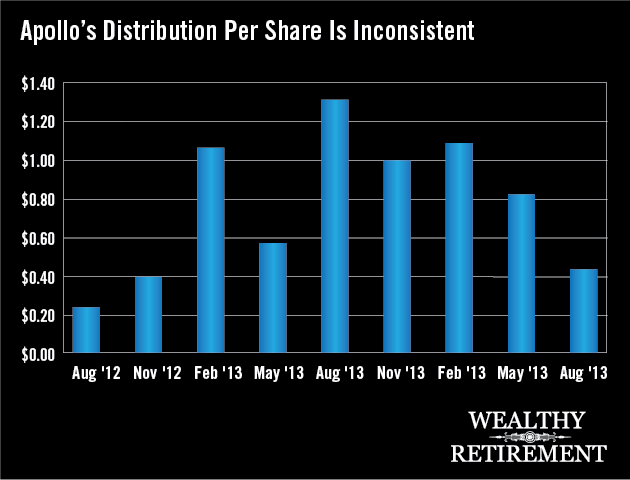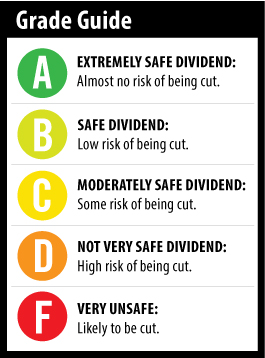 Leon Black is worth nearly $6 billion. He knows a thing or two about finance.
Leon Black is worth nearly $6 billion. He knows a thing or two about finance.
His company, Apollo Global Management (NYSE: APO), runs hedge funds specializing in private equity, real estate and credit. The company is particularly skilled at picking up distressed assets. This week, we’re looking at the company’s dividend safety, thanks to a request from Roger F.
Over the past four quarters, Apollo has paid out $3.39 per share in distributions for a very healthy 14.2% yield, based on today’s stock price.
[ad#Google Adsense 336×280-IA]Note that the company is set up as a partnership and, as a result, pays distributions, not dividends.
Apollo pays out all of its cash flow, aside from what is required to operate its business.
Furthermore, investors receive a K-1 statement, not a 1099-DIV.
As a result, some or most of the income from the shares will be tax deferred.
For more on partnerships and their tax advantages, click here and read item No. 3.
Apollo’s most recent distribution, declared in August, was $0.46. Extrapolated over the full year, that equals a 7.8% yield, which is still not shabby. However, if you look at Yahoo Finance or some other websites, you may see a much smaller yield and distribution listed. That’s because the regular quarterly distribution was $0.15 and the company paid a $0.31 special distribution based on the company’s distributable income. Yahoo and the other sites seem to take only the regular distribution into account when calculating yield.
This is the case each quarter. In 2014, Apollo paid a $0.15 regular quarterly distribution with a varying amount on top of that each quarter. Last year, the regular distribution was $0.07 per quarter with another distribution added to it.
Apollo is a profitable company that generates cash and pays a terrific distribution. The problem is the extra distribution is unreliable. The income that can be distributed is based on income from the company’s investments and its profits when it exits a position.
Obviously, the timing of those sales is not consistent and depends on a variety of factors, some of which are beyond Apollo’s control.
For example, in the second quarter of this year, distributable earnings were $227 million, down from $604 million in the same period in 2013.
The decline was due to less interest earned in loans made by its private equity segment.
As a result of this “lumpiness” – a term used by Wall Street to describe inconsistency from one quarter to another – the dividend varies widely.
 The stock appears cheap, trading at just seven times earnings versus the industry average of 17, so as an out-of-favor, inexpensive stock with a healthy dividend yield, it may be attractive to some investors.
The stock appears cheap, trading at just seven times earnings versus the industry average of 17, so as an out-of-favor, inexpensive stock with a healthy dividend yield, it may be attractive to some investors.
 But for those who need to know what their income is going to be each quarter, Apollo is completely unreliable.
But for those who need to know what their income is going to be each quarter, Apollo is completely unreliable.
If an investor is using the distribution checks to pay living expenses, they may be in for a surprise.
It could be more than was expected, but could also be far less than anticipated.
Though the stock could be attractive to some people, because the dividend is so inconsistent, from a dividend safety perspective, I have to give it my lowest rating.
There is too much of a chance that the dividend could go lower from one quarter to the next.
Dividend Safety Rating: F
— Marc Lichtenfeld
[ad#DTA-10%]
Source: Wealthy Retirement

